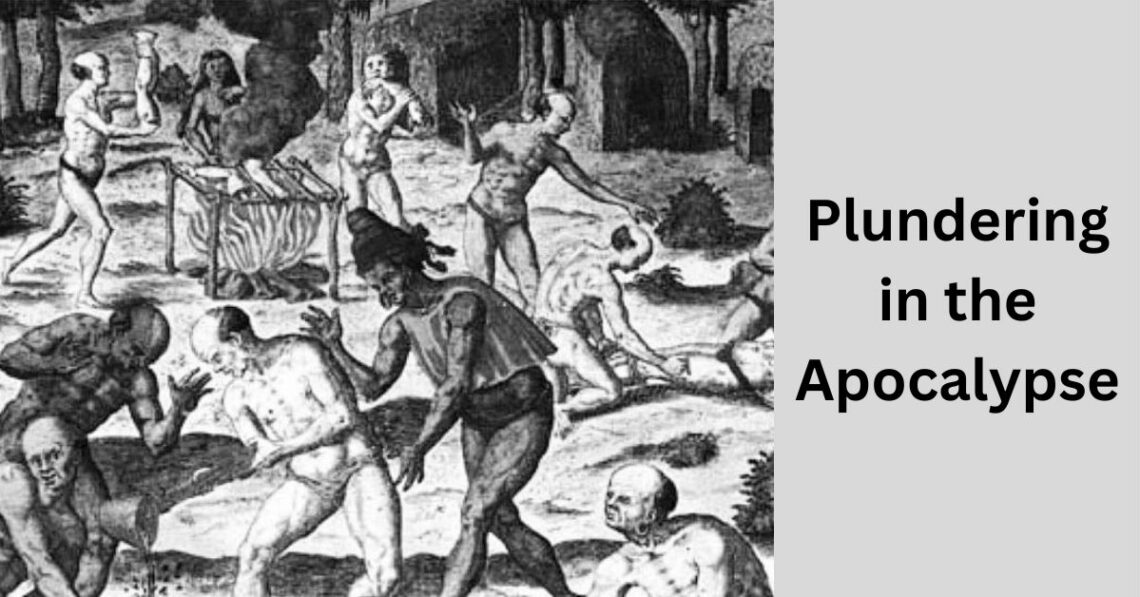
Plundering in the Apocalypse: Survival Instincts or Moral Decay?
In the harsh landscape of an apocalypse, where the thin veil of civilization is torn asunder, humanity’s darker instincts often come to the forefront. One such pervasive behavior that emerges in the chaos is plundering – the act of pillaging and looting for survival or personal gain.
This article delves into the complex dynamics of plundering in the apocalypse, exploring whether it is driven by primal survival instincts or if it reflects a deeper moral decay within the human psyche.
Survival Instincts:
In the face of an apocalypse, where resources are scarce and the conventional structures of society collapse, individuals are driven by an innate survival instinct. Plundering, in this context, can be viewed as a desperate means to secure the essentials for sustenance and protection.
GEEKZILLA AUTOS: PIONEERING THE FUTURE OF AUTOMOTIVE INNOVATION
When faced with the stark reality of life or death, individuals may resort to looting as a primal response to ensure their own survival and that of their loved ones.
In the absence of law enforcement and societal norms, people may feel compelled to take matters into their own hands, seizing whatever resources they can find.

This survival-driven plundering may involve breaking into abandoned stores for food, scavenging for clean water, or acquiring weapons for self-defense against potential threats. While such actions may be morally questionable, they are often driven by a basic human instinct to survive against all odds.
Moral Decay and Opportunism:
However, as the apocalypse unfolds, a darker side of human nature can also come to light. Plundering can transform from a desperate act of survival into a manifestation of moral decay, as some individuals exploit the chaos for personal gain.
The breakdown of societal structures creates an environment where opportunistic individuals seize the chance to accumulate wealth, power, and control through looting.
EUGENIO PALLISCO: A MICHIGAN NATIVE’S JOURNEY OF SUCCESS AND SOCIAL IMPACT
In these cases, plundering is not merely a means of survival but a reflection of a moral erosion that occurs when the constraints of civilization are lifted. The absence of consequences and the breakdown of social norms may lead some individuals to abandon ethical considerations entirely, engaging in acts of violence and exploitation without regard for the well-being of others.
Communities and the Ethics of Plundering:
In the midst of the apocalypse, the dynamics of plundering extend beyond individual actions to impact the formation of communities. Some groups may adopt a cooperative approach, sharing resources and working together for the collective good. In contrast, others may succumb to the lawlessness of plundering, leading to a breakdown of trust and cooperation.
The ethical implications of plundering in a community setting raise questions about the balance between individual survival instincts and the need for collective cooperation. Communities that prioritize collaboration and shared resources may stand a better chance of weathering the challenges posed by the apocalypse, fostering a sense of unity that transcends the instinctual drive for self-preservation.

Survival Instincts and Plundering:
In the initial stages of an apocalypse, individuals find themselves thrust into a harsh reality where the basic necessities of life become scarce commodities. The instinct for self-preservation, deeply ingrained in human nature, compels individuals to take drastic measures to secure food, water, and shelter.
Plundering, in this context, is a manifestation of the primal need to survive against the odds. The breakdown of societal structures leaves individuals with few options, and looting becomes a means of obtaining essential resources for oneself and one’s community.
NATURAL SUPPLEMENTS FOR CALMING FLIGHT ANXIETY
The moral justification for such actions is rooted in the instinctual drive to protect and provide for one’s kin, even if it means resorting to morally ambiguous behavior.
Moral Decay in the Absence of Civilization:
As the apocalypse unfolds and societal norms disintegrate, the thin veneer of civilization peels away, revealing the darker facets of human nature. Plundering can transition from a survival-driven necessity to a symptom of moral decay.
In the absence of consequences and social accountability, some individuals may exploit the chaos for personal gain, engaging in acts of violence, theft, and exploitation. This shift reflects a moral erosion that occurs when the constraints of law and order are removed.
The breakdown of ethical considerations may lead to a dystopian landscape where individuals prioritize their own interests over the well-being of others, contributing to an environment of mistrust and hostility.
Communal Dynamics and Plundering:
The dynamics of plundering extend beyond individual actions to shape the formation of communities in the post-apocalyptic world. Different groups may adopt contrasting approaches, with some prioritizing collaboration and resource-sharing, while others succumb to the lawlessness of plundering.
FROM BEGINNER TO BOSS: 10 ESSENTIAL SKILLS EVERY FRANCHISE OWNER SHOULD MASTER
Communities that manage to maintain a sense of shared responsibility and cooperation stand a better chance of enduring the challenges posed by the apocalypse.
The ethical implications of plundering at the communal level raise profound questions about the balance between individual survival instincts and the imperative for collective well-being. The choices made by communities in these dire circumstances contribute to the broader narrative of human resilience or decay.

The Crossroads of Humanity:
As the apocalyptic scenario unfolds, humanity stands at a crossroads, and the choices made during this tumultuous period may shape the future of the species. Plundering becomes a microcosm of the larger struggle between survival instincts and moral decay.
The actions taken by individuals and communities in the face of adversity become a reflection of humanity’s capacity for resilience, cooperation, or moral deterioration.
The narrative of plundering in the apocalypse is not just a tale of survival; it is a profound exploration of the human condition when faced with extreme circumstances. Whether society tilts towards redemption or decay hinges on the delicate balance between the innate drive to survive and the ethical considerations that define our shared humanity.
GEEKZILLA AUTOS: PIONEERING THE FUTURE OF AUTOMOTIVE INNOVATION
Psychological Toll of Plundering:
Beyond the immediate material consequences, plundering in the apocalypse exacts a psychological toll on individuals. The dichotomy between survival instincts and moral considerations creates an internal conflict that can lead to profound emotional distress.
Those driven by the instinct to survive may grapple with guilt and moral ambiguity as they engage in acts they would find reprehensible in a normal societal context.
On the flip side, individuals who succumb to opportunistic plundering may experience a desensitization to violence and a loss of empathy, further highlighting the psychological ramifications of a world stripped of conventional morality.
The post-apocalyptic psyche becomes a battleground where the fight for survival intertwines with a struggle to retain one’s moral compass.
Legacy of Plundering on Post-Apocalyptic Societies:
The aftermath of widespread plundering leaves a lasting imprint on post-apocalyptic societies. Communities that embrace cooperation and ethical principles may lay the groundwork for rebuilding a semblance of civilization.
Conversely, societies marked by rampant plundering may face prolonged chaos and internal strife. The legacy of plundering influences the development of new norms and values, shaping the trajectory of humanity in the absence of the structures that once defined it.
OAKLEY RAE: A DIGITAL MAVEN MAKING A DIFFERENCE
The interplay between survival instincts and moral decay ultimately determines whether post-apocalyptic societies will rise from the ashes with a renewed sense of shared purpose or descend into a state of perpetual anarchy.
In essence, the consequences of plundering extend far beyond the immediate challenges of survival, becoming a pivotal factor in shaping the destiny of a world grappling with the aftermath of an apocalypse.
Conclusion:
Plundering in the apocalypse is a multifaceted phenomenon that reflects the interplay of survival instincts and moral decay. While some individuals may resort to looting out of sheer necessity, others exploit the chaos for personal gain, leading to a breakdown of ethical considerations.
The dynamics of plundering extend beyond individual actions, shaping the formation of communities and influencing the overall trajectory of humanity in the face of existential threats. As society teeters on the brink, the choices made during these tumultuous times may define the course of human survival and the potential for moral redemption or decay.
You May Also Like

From Hеart Hеalth To Anti-Aging: The Numeric Wonders Of Trans-Resveratrol
December 10, 2023
Analyzing the Impact of Skip Bayless’ Tweets on Sports Commentary
February 2, 2024

